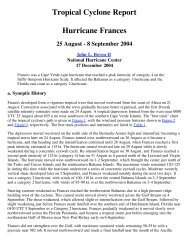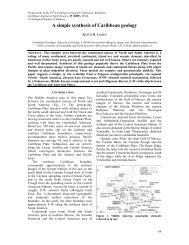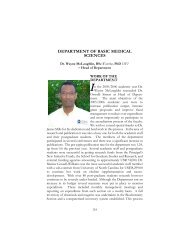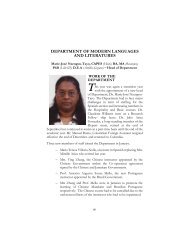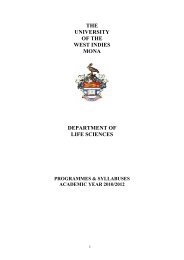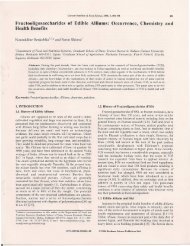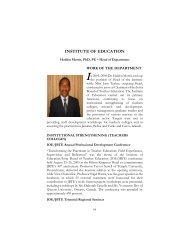Medical Sciences - University of the West Indies
Medical Sciences - University of the West Indies
Medical Sciences - University of the West Indies
Create successful ePaper yourself
Turn your PDF publications into a flip-book with our unique Google optimized e-Paper software.
FACULTY OF MEDICAL SCIENCES<br />
EPID6104 Critical Evaluation <strong>of</strong> <strong>the</strong> Medial<br />
Literature and Writing Scientific<br />
Manuscripts<br />
This module aims to describe and illustrate <strong>the</strong><br />
methods available for identifying and reviewing<br />
quantitative and qualitative literature. This will provide<br />
students with a perspective on <strong>the</strong> development<br />
and uses <strong>of</strong> epidemiology through discussion <strong>of</strong> key<br />
epidemiological papers. The student should develop<br />
<strong>the</strong> skills to find, interpret and criticize information<br />
in <strong>the</strong> epidemiological literature and <strong>the</strong> competence<br />
to write scientific manuscripts in accordance with<br />
<strong>the</strong> requirements <strong>of</strong> journals and o<strong>the</strong>r publications.<br />
Content areas include planning <strong>the</strong> review: <strong>the</strong> role<br />
<strong>of</strong> <strong>the</strong> literature review and specification <strong>of</strong> <strong>the</strong> task,<br />
identification <strong>of</strong> relevant literature both published<br />
and unpublished: developing a search strategy and<br />
using bibliographic databases, appraising <strong>the</strong> literature:<br />
methods for assessing <strong>the</strong> quality <strong>of</strong> quantitative<br />
and qualitative research, syn<strong>the</strong>sizing <strong>the</strong> evidence:<br />
integration <strong>of</strong> <strong>the</strong> evidence using both quantitative<br />
and qualitative methods; principles <strong>of</strong> meta-analysis,<br />
formulating recommendations and writing reviews.<br />
EPID6105 Research Ethics<br />
The aim <strong>of</strong> this module is for students to develop an<br />
awareness and knowledge <strong>of</strong> <strong>the</strong> ethical principles<br />
which guide researchers, especially those studying<br />
human subjects.<br />
Content areas include historical events that have influenced<br />
current ethical guidelines, <strong>the</strong> fundamental<br />
ethical principles that guide <strong>the</strong> ethical conduct <strong>of</strong><br />
research involving human participants, International<br />
guidelines in <strong>the</strong> protection <strong>of</strong> human participants,<br />
<strong>the</strong> responsibilities <strong>of</strong> organizations or individuals in<br />
protecting human participants, maintaining confidentiality<br />
throughout <strong>the</strong> research process, <strong>the</strong> informed<br />
consent process and vulnerable populations, <strong>the</strong><br />
role <strong>of</strong> regulatory bodies and institutions in maintaining<br />
ethical standards, Research Ethics in <strong>the</strong> Caribbean.<br />
EPID6106 Epidemiology <strong>of</strong> Infectious Diseases and<br />
HIV/AIDS<br />
The aim <strong>of</strong> this module is to provide a multidisci-<br />
plinary framework for understanding <strong>the</strong> principles <strong>of</strong><br />
interventions against infectious diseases. It provides<br />
perspectives on <strong>the</strong> epidemiology <strong>of</strong> communicable<br />
diseases: basic concepts and methods; epidemiological<br />
aspects <strong>of</strong> vaccination; surveillance and outbreak<br />
investigation; and detailed discussion <strong>of</strong> <strong>the</strong><br />
epidemiology <strong>of</strong> important representative infectious<br />
diseases.<br />
It also provides students with an understanding <strong>of</strong><br />
<strong>the</strong> control <strong>of</strong> communicable diseases in countries<br />
with a developed public health infrastructure. Special<br />
emphasis will be placed on HIV/AIDS as one <strong>of</strong><br />
<strong>the</strong> threats to health in <strong>the</strong> Caribbean. Content areas<br />
include Principles <strong>of</strong> infectious disease (ID) epidemiology,<br />
principles <strong>of</strong> surveillance, epidemiological<br />
methods I: Lot Quality Assurance Sampling (LQAS),<br />
Infectious Disease Outbreak investigation and selection<br />
<strong>of</strong> appropriate comparison groups and logistical<br />
issues; ma<strong>the</strong>matical models for ID; New vaccines:<br />
GRADUATE STUDENTS INFORMATION GUIDE 2011/2012 94



